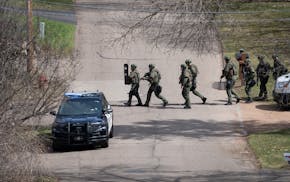For staff and students at Henry Sibley High School, the more things change, the more they'll stay the same — at least in terms of schedules.
After voting last June to move the high school to a six-period day starting this fall, the school board reversed itself two weeks ago and opted to keep the seven-period day.
"The high school schedule is a very complex animal," said board Chairman Mark Spurr. "The problem was the way calculations were originally done. It turned out we'd save only $230,000 by making the change, which was not as much as we thought." The district had thought it was closer to $400,000.
In January 2012, the West St. Paul-Mendota Heights-Eagan district assembled a committee of parents, residents and administrators to examine the high school schedule in an effort to save money, said Superintendent Nancy Allen-Mastro.
That committee recommended changing to a six-period day, which has several benefits, Allen-Mastro said, including students having more time in each class and more efficiency in staffing.
Having six periods "aligns with our middle school schedule so staff can be shared between buildings," she said.
But the idea of less savings than expected deflated the idea some, and some parents raised objections to the new schedule.
It was "really parents giving the backlash," Spurr said. "People started talking about potential negative impacts. I think we had a good dialogue."
Students can take fewer electives with the six-period day, and the school would have had to add a "zero hour" and summer school classes to accommodate the school's graduation requirements. Music and world languages were especially hard to fit in. A "zero hour," or an additional period scheduled before the day officially begins, creates transportation challenges for students, Farber noted.
Another issue was early release during seventh period for athletes, said Holly Farber, a parent who was a member of the panel recommending the change. Currently, some athletes, like Farber's sophomore sons who play tennis, are let out early during a last-period study hall to attend games or matches. Sibley's school day, which ends at 3:05, lets out later than most other area schools do, necessitating the early release.
"It was a tough conversation but it was very civil," Farber said. "I'm very proud of the way our community handled the conversation, and I'm happy with the outcome."
Because students had already registered for next fall's classes — in February they signed up for just six — the high school had to scramble a bit to get students registered for another elective earlier this month.
Mastro-Allen said the staff has done a great job coordinating students' registration, and Farber said her kids were excited to sign up for another elective.
But Spurr said he would have liked to avoid the scurrying.
"If we do scheduling changes in the future, we're going to execute it much better than this," he said.
And in the future, the board may revisit the seven-period conversation, Spurr said, because it does cost more to offer the additional class.
"We have to put that in the context of the larger budget puzzle," he said.
Mastro-Allen said that although there are no plans to do that now, the board will get updates on how things are going.
"Going forward, administrators plan to monitor class registrations and provide periodic updates to the board on the status of the seven-period schedule, including updates on the budget," she said.
Farber said that despite the change in plans, she found the experience of being on the committee and witnessing the discussion that followed valuable.
"I wouldn't even call this a mistake," Farber said. "There are so many ways to have a great school."
Erin Adler • 952-746-3283

FAFSA completions in Minnesota drop amid flawed efforts to update form

Wisconsin Republicans ignore governor's call to spend $125M to combat 'forever chemicals'

Man killed in Minnetonka by law enforcement started gun battle with deputies, BCA says

